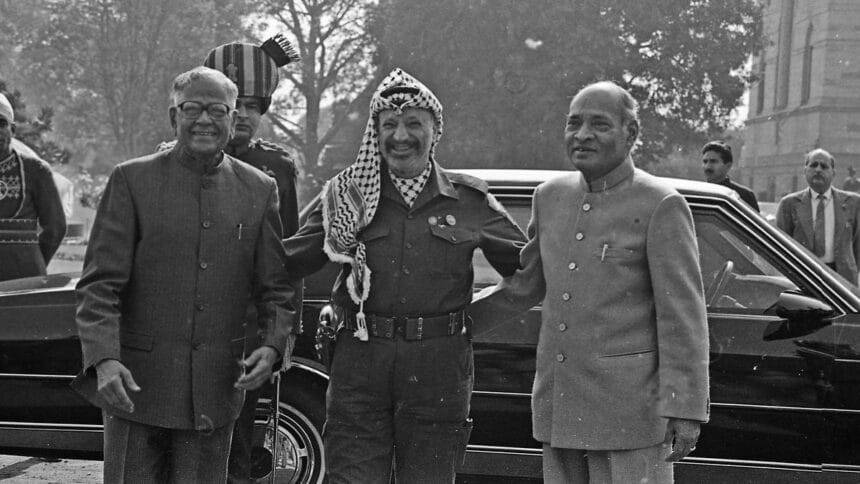Main Points In Hindi (मुख्य बातें – हिंदी में)
-
भारत की बदलती विदेश नीति: भारत की फ़िलिस्तीन के प्रति नीति में विशेष परिवर्तन आया है, जो शीत युद्ध के अंत के बाद इज़राइल के साथ बढ़ते संबंधों और हिंदुत्व के प्रभाव को दर्शाता है। यह बदलाव पहले उपनिवेशवाद-विरोधी लोकाचार से दूर होकर लेन-देन संबंधी कूटनीति की ओर बढ़ा है, जहाँ आर्थिक और रणनीतिक हित अधिक प्राथमिकता पाते हैं।
-
हिंदुत्व का प्रभाव: भारतीय जनता पार्टी (भाजपा) और संघ परिवार द्वारा हिंदू राष्ट्रवादी दृष्टिकोण को अपनाने से विदेश नीति पर असर पड़ा है। फ़िलिस्तीन के मुद्दे को सांप्रदायिक के रूप में देखा जाने लगा है, जिससे इस विषय में समर्थन को ‘राष्ट्र-विरोधी’ कहकर खारिज किया जा रहा है।
-
आर्थिक और रणनीतिक हितों का प्रमुखता: भारत की विदेश नीति अब ऐतिहासिक प्रतिबद्धताओं से अधिक तात्कालिक आर्थिक और सामरिक हितों पर केंद्रित हो गई है। इज़राइल के साथ बढ़ते व्यापारिक संबंध और रक्षा सहयोग दिखाते हैं कि फ़िलिस्तीनी मुद्दा अब प्राथमिकता नहीं रही।
-
महान शक्ति की महत्वाकांक्षाएँ: भारत की महान शक्ति के रूप में उभरने की आकांक्षा भी फ़िलिस्तीन के प्रति समर्थन को कमजोर कर रही है। यह अमेरिका के साथ तालमेल और चीन-अमेरिका प्रतियोगिता के संदर्भ में नीतियों के संचालन को प्रभावित कर रहा है।
- वैश्विक राजनीति में स्थान: भारत अब उपनिवेशवाद-विरोधी संघर्षों के चैंपियन के रूप में अपनी भूमिका से दूर होता जा रहा है और संकीर्ण स्वार्थों द्वारा परिभाषित एक नई अंतरराष्ट्रीय व्यवस्था की ओर बढ़ रहा है। इस प्रक्रिया में मूल्यों की जगह सत्ता की राजनीति का प्रभुत्व बढ़ रहा है।
Main Points In English(मुख्य बातें – अंग्रेज़ी में)
Here are the main points from the article regarding India’s position on Palestine:
-
Shift in Policy and Ideological Influence: India’s historical support for Palestine, rooted in anti-colonial struggles and self-determination, has weakened significantly post-Cold War. The rise of Hindutva and the influence of the BJP have shifted this support to a more communal perspective, associating the Palestinian issue primarily with Muslim identity and security concerns.
-
Transactional Diplomacy Over Values: A significant change in India’s foreign policy approach has transitioned from value-based support for Palestine to a more transactional diplomacy. This shift prioritizes narrow, strategic interests, particularly in the context of growing economic and military ties with Israel, further diminishing India’s commitment to Palestinian solidarity.
-
Geopolitical Ambitions and Alignments: India’s aspiration to emerge as a major global player has influenced its stance on various international issues, including Palestine. As it seeks deeper cooperation with the United States and navigates the competitive dynamics between China and the U.S., India’s relationship with Israel has strengthened, often at the expense of its traditional support for Palestine.
-
Domestic and Global Factors Interplay: The changing dynamics of India’s foreign policy towards Palestine are shaped by both domestic politics and global influences. Nationalistic narratives and security concerns increasingly frame public discourse, leading to a suppression of pro-Palestinian sentiments and actions within India.
- Diminished Role as Champion of Anti-Colonial Struggles: In the current international context, India appears to be moving away from its historical role as a champion of anti-colonial movements, choosing to prioritize strategic interests over principled stances. This reflects a broader trend of realigning foreign policy to accommodate economic gains and power politics in a complex global landscape.


Complete News In Hindi(पूरी खबर – हिंदी में)
फ़िलिस्तीन पर भारत की स्थिति, जो कभी उसके उपनिवेशवाद-विरोधी लोकाचार का प्रतीक थी, शीत युद्ध की समाप्ति के बाद से कमजोर हो गई है और पिछले दशक में नाटकीय रूप से बदल गई है। इज़राइल के साथ तालमेल, फ़िलिस्तीन को हाशिये पर धकेलना, और लेन-देन संबंधी कूटनीति पर ध्यान केंद्रित करना अलग-अलग घटनाएँ नहीं हैं, बल्कि घरेलू और वैश्विक कारकों की परस्पर क्रिया से आकार लेने वाली परस्पर जुड़ी प्रवृत्तियाँ हैं।
हिंदुत्व और विदेश नीति
पहला, फ़िलिस्तीन पर भारत की विकसित होती नीति हिंदुत्व के उदय से अविभाज्य है। भारतीय जनता पार्टी (भाजपा) और संघ परिवार ने हिंदू राष्ट्रवादी विश्वदृष्टि के आधार पर भारत की कूटनीति को प्रभावित करने की कोशिश की है। यह वैचारिक बदलाव इज़राइल के साथ बढ़ती आत्मीयता में प्रकट हुआ है, जिसे ‘इस्लामी आतंक’ के कथित खतरे के खिलाफ एक स्वाभाविक भागीदार के रूप में देखा जाता है, और जाहिर तौर पर इसका शिकार माना जाता है – एक कथा जो हिंदुत्व प्रवचन में गहराई से अंतर्निहित है।
ऐतिहासिक रूप से, फ़िलिस्तीन के लिए भारत का समर्थन उसके उपनिवेशवाद-विरोधी संघर्ष, आत्मनिर्णय और नस्लवाद-विरोध में निहित था। हालाँकि, ‘न्यू इंडिया’ में इस समर्थन को सांप्रदायिक चश्मे से देखा जाता है, जहाँ फिलिस्तीनी मुद्दे को विशेष रूप से मुस्लिम पहचान से जोड़ा जाता है। दक्षिणपंथी मीडिया द्वारा प्रचारित सार्वजनिक चर्चा, फिलिस्तीन समर्थक विरोध प्रदर्शन और एकजुटता को राष्ट्रीय सुरक्षा और ‘राष्ट्र-विरोधी’ के लिए खतरा बताती है।
फ़िलिस्तीन का समर्थन करने वाले विरोध प्रदर्शनों पर अक्सर कार्रवाई, गिरफ़्तारी और यहां तक कि ग़ैरक़ानूनी गतिविधि (रोकथाम) अधिनियम के तहत आरोप भी लगाए जाते हैं। असदुद्दीन ओवैसी जैसे नेता, जो सार्वजनिक रूप से फिलिस्तीन के लिए समर्थन की आवाज उठाते हैं, को नियमित रूप से अपमानित किया जाता है, जबकि एकजुटता व्यक्त करने वाले छात्रों को निशाना बनाया जाता है। फ़िलिस्तीनी मुद्दे को अवैध ठहराने में राज्य की मौन स्वीकृति उसे न केवल कूटनीतिक रूप से बल्कि वैचारिक रूप से भी इज़राइल के साथ जुड़ने में मदद करती है।
अपनी 2017 की यात्रा के दौरान प्रधानमंत्री नरेंद्र मोदी का ज़ायोनीवाद के संस्थापक थियोडोर हर्ज़ल को श्रद्धांजलि देने के लिए माउंट हर्ज़ल में अनिर्धारित रुकना इस वैचारिक अभिसरण का प्रतीक है। उनके तहत, विदेश नीति अब अपनी ऐतिहासिक प्रतिबद्धताओं से नहीं, बल्कि एक नए आख्यान से तय होती है जो कथित खतरों के खिलाफ साझा लड़ाई में इजरायल को एक रणनीतिक सहयोगी के रूप में देखता है।
मूल्य या ‘हित’?
भारत में बदलाव लाने वाला दूसरा कारक मूल्य-आधारित से लेन-देन संबंधी कूटनीति की ओर संक्रमण है। नेहरूवादी युग के दौरान, भारत की विदेश नीति उपनिवेशवाद-विरोध के साथ गहराई से जुड़ी हुई थी, जिसमें फिलिस्तीनी राज्य के लिए मजबूत समर्थन भी शामिल था। शीत युद्ध के अंत में, उस वैचारिक आधार ने अधिक लेन-देन संबंधी दृष्टिकोण को रास्ता देना शुरू कर दिया, जहां संकीर्ण रूप से परिभाषित हितों को ऐतिहासिक प्रतिबद्धताओं पर प्राथमिकता दी गई। भारत-इजरायल संबंध इसी परिवर्तन का परिणाम हैं।
इज़राइल के साथ भारत के संबंध हाल ही में समृद्ध हुए हैं, 2022-23 में द्विपक्षीय व्यापार 10 बिलियन डॉलर से अधिक तक पहुंच गया है। सहयोग रक्षा, कृषि और प्रौद्योगिकी जैसे क्षेत्रों तक फैला हुआ है, ऐसे क्षेत्र जहां इज़राइल एक अमूल्य भागीदार बन गया है। नए सिरे से जुड़ाव को ‘डीहाइफेनेशन’ के दोहरे स्तंभों द्वारा परिभाषित किया गया है, जिसमें इज़राइल और फिलिस्तीन के साथ भारत के संबंधों को अलग माना जाता है, और ‘अराजनीतिकरण’, राजनीतिक रूप से संवेदनशील सवालों को दरकिनार करके सहयोग को बढ़ाया जाता है। अराजनीतिकरण करना और अराजनीतिकरण करना राजनीतिक कृत्य हैं। इससे नई दिल्ली को फ़िलिस्तीनी मुद्दे पर दिखावा करते हुए इज़राइल के साथ अपने जुड़ाव को गहरा करने की अनुमति मिलती है।
हालाँकि, लेन-देन संबंधी कूटनीति की ओर यह बदलाव भारत के लिए अद्वितीय नहीं है। विश्व स्तर पर, विदेशी नीतियां तेजी से निर्मित आर्थिक और रणनीतिक हितों द्वारा निर्देशित होती हैं। भारत के मामले में, पश्चिम एशिया नीति 1990 के दशक के बाद से महत्वपूर्ण रूप से विकसित हुई है, जिसमें ऊर्जा सुरक्षा, प्रवासी और निवेश केंद्र में हैं। पुराना गुटनिरपेक्ष प्रतिमान, जो कभी भारत की स्थिति को नियंत्रित करता था, अब इन उद्देश्यों को पूरा करने के लिए अपर्याप्त माना जाता है।
फ़िलिस्तीन के प्रति भारत का दृष्टिकोण इसी प्रवृत्ति को दर्शाता है। चूँकि सरकार खाड़ी से निवेश आकर्षित करने और नई साझेदारियाँ बनाने पर ध्यान केंद्रित कर रही है, तत्काल आर्थिक या रणनीतिक लाभ के अभाव में फिलिस्तीनी मुद्दा हाशिये पर चला गया है। जवाहरलाल नेहरू और इंदिरा गांधी के भारत के साथ तुलना करने पर यह बदलाव स्पष्ट है, जिसमें फिलिस्तीन के लिए समर्थन को एक नैतिक कर्तव्य के रूप में देखा गया था।
महत्वाकांक्षाएं और महान खेल
अंततः, एक महान शक्ति के रूप में उभरने की भारत की आकांक्षा ने भी महत्वपूर्ण भूमिका निभाई है। जबकि वह यूक्रेन संघर्ष में दलाल के रूप में उभरने की कोशिश कर रहा है, साथ ही वह फिलिस्तीन के लिए अपना समर्थन भी त्याग रहा है। पश्चिम एशिया सहित विभिन्न क्षेत्रों में चीन-अमेरिका प्रतियोगिता के बीच, इज़राइल के सबसे कट्टर सहयोगी, अमेरिका के साथ भारत का तालमेल भी एक योगदान कारक है।
महान सत्ता की राजनीति के इस समय में, गुटनिरपेक्षता और उपनिवेशवाद-विरोध के विरासत आदर्शों को बोझ के रूप में देखा जाता है। यह गुटनिरपेक्षता से रणनीतिक स्वायत्तता से बहुसंरेखण की आलंकारिक बदलाव में सबसे अच्छी तरह से परिलक्षित होता है। जबकि परिचालन सार वही रहता है, प्रत्येक रीब्रांडिंग में मानक कमजोरीकरण देखा गया है। यह गाजा पर इजरायल के युद्ध के प्रति भारत की मौन प्रतिक्रिया से स्पष्ट है।
व्यापक जनहानि और विनाश के बावजूद, नई दिल्ली की प्रतिक्रिया शांति और बातचीत का आह्वान करने वाले (गैर) बयानों तक ही सीमित रही है। इज़राइल के साथ संबंधों को मजबूत करने, रक्षा साझेदारी हासिल करने और अन्य क्षेत्रीय अवसरों का लाभ उठाने पर ध्यान केंद्रित है।
हिंदुत्व के उदय, लेन-देन संबंधी कूटनीति और चीन-अमेरिका प्रतिद्वंद्विता के संदर्भ में भारत की रणनीतिक महत्वाकांक्षाओं ने फिलिस्तीनी मुद्दे को हाशिए पर धकेलने में योगदान दिया है।
हालांकि आधिकारिक बयानबाजी अभी भी दो-राज्य समाधान का समर्थन कर सकती है, लेकिन ज़मीनी हकीकत इसराइल के साथ संबंधों को मजबूत करने और मानक प्रतिबद्धताओं पर आर्थिक और रणनीतिक हितों को प्राथमिकता देने की दिशा में एक अलग बदलाव को दर्शाती है।
अंतर्राष्ट्रीय राजनीति के इस नए युग में, भारत उपनिवेशवाद-विरोधी संघर्षों के चैंपियन के रूप में अपनी भूमिका से दूर चला गया है। इसके बजाय, इसने मूल्यों पर संकीर्ण हितों द्वारा परिभाषित मार्ग अपनाया है। जैसे-जैसे वैश्विक व्यवस्था विकसित हो रही है, क्या भारत उस रास्ते पर चलता रहेगा जो इसे सिद्धांतों के बजाय सत्ता की राजनीति के साथ जोड़ देगा?
जैसा कि स्थिति है, ‘नई’ अंतर्राष्ट्रीय व्यवस्था संभवतः नए खिलाड़ियों के साथ वही खेल होगी।
चेतन राणा 9डैशलाइन के एसोसिएट एडिटर और जवाहरलाल नेहरू विश्वविद्यालय, नई दिल्ली से डॉक्टरेट उम्मीदवार हैं
प्रकाशित – 09 अक्टूबर, 2024 12:08 पूर्वाह्न IST
Complete News In English(पूरी खबर – अंग्रेज़ी में)
India’s stance on Palestine, which once symbolized its anti-colonial principles, has weakened since the end of the Cold War and has dramatically changed over the past decade. The increasing alignment with Israel, sidelining Palestine, and focusing on transactional diplomacy are interconnected trends shaped by both domestic and global factors.
Hindutva and Foreign Policy
First, India’s evolving policy towards Palestine is closely linked to the rise of Hindutva. The Bharatiya Janata Party (BJP) and its affiliates have sought to influence India’s diplomacy based on a Hindu nationalist worldview, which is evident in the growing affinity towards Israel, viewed as a natural ally against the alleged threat of ‘Islamic terrorism’—a narrative deeply embedded in Hindutva discourse.
Historically, India’s support for Palestine stemmed from its commitment to anti-colonial struggles, self-determination, and opposition to racism. However, in ‘New India’, this support is viewed through a communal lens, where the Palestinian issue is specifically linked to Muslim identity. Right-wing media often portray pro-Palestine protests as threats to national security and label them as ‘anti-national’.
Protests supporting Palestine frequently face crackdowns, arrests, and legal actions under anti-terror laws. Leaders like Asaduddin Owaisi, who vocally support Palestine, are regularly insulted, while students expressing solidarity are targeted. The state’s tacit acceptance of delegitimizing the Palestinian issue facilitates its ideological alignment with Israel.
Prime Minister Narendra Modi’s unscheduled stop at Mount Herzl to pay tribute to Zionism’s founder, Theodor Herzl, during his 2017 visit symbolizes this ideological convergence. Under his leadership, foreign policy is increasingly determined by a new narrative that views Israel as a strategic ally in a shared fight against perceived threats, rather than adhering to historical commitments.
Values or ‘Interests’?
The second factor driving change in India is the shift from value-based to transactional diplomacy. During the Nehru era, India’s foreign policy was closely linked to anti-colonialism and included strong support for the Palestinian state. Following the end of the Cold War, this ideological foundation gave way to a more transactional approach, prioritizing narrowly defined interests over historical commitments. The India-Israel relationship is a direct outcome of this shift.
India’s ties with Israel have recently flourished, with bilateral trade exceeding $10 billion in 2022-23. Cooperation extends across sectors such as defense, agriculture, and technology, where Israel has become a vital partner. The renewed engagement is characterized by the dual pillars of ‘de-hyphenation’, separating India’s relations with Israel and Palestine, and ‘apoliticization’, which avoids politically sensitive issues to enhance collaboration. This de-politicization also allows New Delhi to deepen its engagement with Israel while pretending to address the Palestinian issue.
However, this shift towards transactional diplomacy is not unique to India. Globally, foreign policies are increasingly driven by economic and strategic interests. In India’s case, its West Asia policy has significantly evolved since the 1990s, focusing on energy security, migration, and investment. The old non-alignment paradigm that once guided India’s position is now deemed inadequate for achieving these goals.
India’s approach towards Palestine reflects this trend. As the government focuses on attracting investments from the Gulf and forging new partnerships, the Palestinian issue has been sidelined due to the lack of immediate economic or strategic benefits. Comparisons with the policies of Jawaharlal Nehru and Indira Gandhi highlight this change, where support for Palestine was seen as a moral obligation.
Aspirations and the Great Game
Ultimately, India’s aspirations to emerge as a great power also play a significant role. While it tries to act as a mediator in the Ukraine conflict, it is simultaneously distancing itself from the Palestinian cause. In the backdrop of the China-U.S. rivalry, especially in West Asia, India’s alignment with the U.S.—Israel’s closest ally—further contributes to this trend.
In the current great power politics, the ideals of non-alignment and anti-colonialism are often viewed as burdens. This is best illustrated in the transition from non-alignment to a strategic autonomy based on multiple alignments. While the operational essence remains similar, each rebranding reflects a dilution of standards. This is notably seen in India’s muted response to the ongoing Israeli actions in Gaza.
Despite the widespread loss of life and destruction, New Delhi’s response has been limited to calls for peace and dialogue. Its focus remains on strengthening ties with Israel, securing defense partnerships, and seizing other regional opportunities.
The rise of Hindutva, the shift towards transactional diplomacy, and the context of China-U.S. rivalry have all contributed to sidelining the Palestinian issue in India’s strategic considerations.
While official rhetoric may still support a two-state solution, the ground reality reflects a clear shift towards enhancing relations with Israel and prioritizing economic and strategic interests over historical commitments.
In this new era of international politics, India has drifted away from its role as a champion of anti-colonial struggles. Instead, it has adopted a path defined by narrow interests rather than principles. As the global order continues to evolve, will India persist on a course that aligns it more with power politics than with its foundational values?
As it stands, the ‘new’ international order may very well be the same game with new players.
Chetan Rana is an Associate Editor at 9DashLine and a PhD candidate at Jawaharlal Nehru University, New Delhi.
Published – 09 October, 2024 12:08 AM IST








